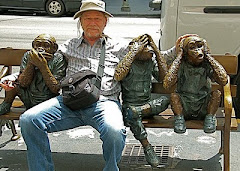 |
| The woods across the road from my home CC Jean Stimmell: 2014 |
How the world changes. I have an anxiety disorder. In the psychological stone age that existed sixty years ago, I repressed that knowledge so thoroughly I didn't even know I had it. That was the age of John Wayne,' when anxiety was –to use the lingo – found only in 'pussies,' not in 'real men.'
The healthy choice at the time would have been to accept I had anxiety and learn positive coping mechanisms to diminish it. Because that option was unknown to me – and unacceptable if I had known – I went in the opposite direction, covering up my symptoms with bravado, risk-taking, and alcohol.
Anxiety was the antithesis of traditional masculinity, which portrayed men as strong, silent, and emotionless – except for rage and anger. Even sweating was prohibited. I remember an incident in boot camp when I was called out by my drill instructor for being a wimp because my hands were sweating.
Now, fast-forward to the present, and the pendulum has swung 180 degrees in the other direction to a point where anxiety is now hip, particularly for the young: kids share their symptoms openly in group chats, rattling off their diagnoses "with a casualness once reserved for high-school gossip.1
Acknowledging that one has an anxiety disorder and seeking help for it is, of course, significant progress, but today, things may have gone overboard. Darby Saxbe, a clinical psychologist, sees evidence that anxiety has swung from being stigmatized to being a status symbol: "I worry that for some people, it's become an identity marker that makes people feel special and unique.”2
But that notion that anxiety is immutable, forever able to determine who a person is, is a harmful myth. On the contrary, because anxiety is modifiable and malleable, it is highly treatable – the opposite of a fixed identity.
As a former psychotherapist, I am pro-therapy. But I am on the same page with Saxbe when she writes “we may have overcorrected from an era when mental health was shameful to talk about to an era when some vulnerable people surround themselves with conversations and media about anxiety and depression, which makes them more vigilant about symptoms and problems, which makes them more likely to problematize normal daily stress.”
That’s never going to work.
It’s universally acknowledged that rumination and social avoidance only make anxiety worse. Saxbe has a radical solution which she calls the principle of opposite action: “I would tell people to do what’s uncomfortable, to run toward danger,” Trust yourself: “You are not your anxiety. You’re so much more.”
Strangely, her solution sounds like my old macho stance, which, I have to say, had some good points: Forcing myself out into the world to confront what scared me was successful in many objective ways.
But the way I did it came at a high cost, numbing my feelings, empathy, and ability to relate to others. It took many years to have the courage to run toward danger, not on some macho dare but to express how I really felt and to stand up more often for what is right – in a world that has increasingly run amuck.
That's the secret to real success! To run straight into danger, not in a macho manner like John Wayne, but in the even scarier system suggested by Socrates: “Know thyself.”
xxx
1 https://www.theatlantic.com/ideas/archive/2023/12/therapy-language-anxiety-mental-health/676325/
2 Ibid.


















